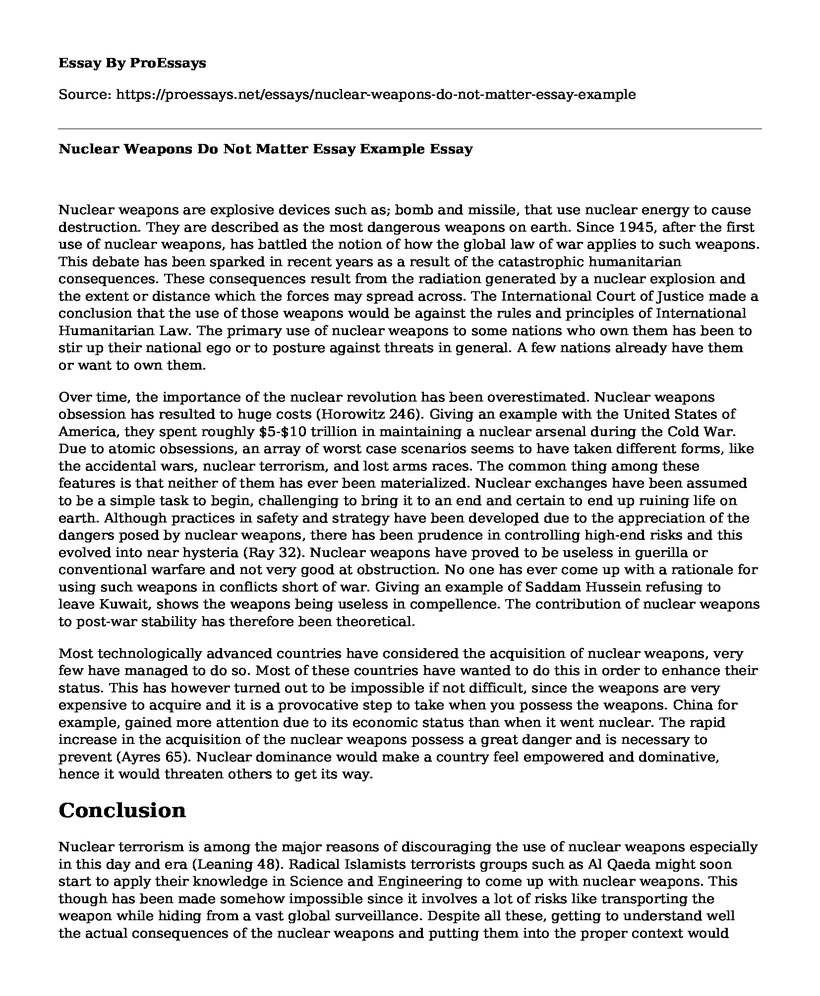Nuclear weapons are explosive devices such as; bomb and missile, that use nuclear energy to cause destruction. They are described as the most dangerous weapons on earth. Since 1945, after the first use of nuclear weapons, has battled the notion of how the global law of war applies to such weapons. This debate has been sparked in recent years as a result of the catastrophic humanitarian consequences. These consequences result from the radiation generated by a nuclear explosion and the extent or distance which the forces may spread across. The International Court of Justice made a conclusion that the use of those weapons would be against the rules and principles of International Humanitarian Law. The primary use of nuclear weapons to some nations who own them has been to stir up their national ego or to posture against threats in general. A few nations already have them or want to own them.
Over time, the importance of the nuclear revolution has been overestimated. Nuclear weapons obsession has resulted to huge costs (Horowitz 246). Giving an example with the United States of America, they spent roughly $5-$10 trillion in maintaining a nuclear arsenal during the Cold War. Due to atomic obsessions, an array of worst case scenarios seems to have taken different forms, like the accidental wars, nuclear terrorism, and lost arms races. The common thing among these features is that neither of them has ever been materialized. Nuclear exchanges have been assumed to be a simple task to begin, challenging to bring it to an end and certain to end up ruining life on earth. Although practices in safety and strategy have been developed due to the appreciation of the dangers posed by nuclear weapons, there has been prudence in controlling high-end risks and this evolved into near hysteria (Ray 32). Nuclear weapons have proved to be useless in guerilla or conventional warfare and not very good at obstruction. No one has ever come up with a rationale for using such weapons in conflicts short of war. Giving an example of Saddam Hussein refusing to leave Kuwait, shows the weapons being useless in compellence. The contribution of nuclear weapons to post-war stability has therefore been theoretical.
Most technologically advanced countries have considered the acquisition of nuclear weapons, very few have managed to do so. Most of these countries have wanted to do this in order to enhance their status. This has however turned out to be impossible if not difficult, since the weapons are very expensive to acquire and it is a provocative step to take when you possess the weapons. China for example, gained more attention due to its economic status than when it went nuclear. The rapid increase in the acquisition of the nuclear weapons possess a great danger and is necessary to prevent (Ayres 65). Nuclear dominance would make a country feel empowered and dominative, hence it would threaten others to get its way.
Conclusion
Nuclear terrorism is among the major reasons of discouraging the use of nuclear weapons especially in this day and era (Leaning 48). Radical Islamists terrorists groups such as Al Qaeda might soon start to apply their knowledge in Science and Engineering to come up with nuclear weapons. This though has been made somehow impossible since it involves a lot of risks like transporting the weapon while hiding from a vast global surveillance. Despite all these, getting to understand well the actual consequences of the nuclear weapons and putting them into the proper context would change the view of policy-makers to be more sensible. More needs to be done to decrease the risks of accidental or intentional nuclear detonations. It is time to take action for all the influential States related to nuclear revolution, to bring to an end the era of nuclear weapons by acting with urgency.
Works Cited
Ayres, U. Environmental Effects of Nuclear Weapons. New York: The Hudson Institute, 19965. Document.
Horowitz, Michael. "The Spread of Nuclear Weapons and International Conflict: Does Experience Matter?" The Journal of Conflict Resolution (2009): 235-258. Document.
Leaning, J. "What Purpose Does It Serve and What Survival Does It Promise." Civil Defence in the Nuclear Age (1983): 41-52. Document.
Ray, Amit. Peace on the Earth A Nuclear Weapons Free World. Calcutta: Inner Light Publishers, 2015. Document.
Cite this page
Nuclear Weapons Do Not Matter Essay Example. (2022, Sep 26). Retrieved from https://proessays.net/essays/nuclear-weapons-do-not-matter-essay-example
If you are the original author of this essay and no longer wish to have it published on the ProEssays website, please click below to request its removal:
- Trump's Acceptance Speech Analysis
- Essay on Documentary Analysis: 13th (2016), The Mask You Live In (2015)
- Marxist Criticism on Mary Shelley's Frankenstein Essay Example
- Research Paper on Dubai Water and Electricity Authority
- Essay Example on Election Campaigning: Social Media's New Use
- Drug Prescribing & Clinical Negligence: Mitigating Risk in Medical Facilities - Essay Sample
- Report Sample on the U.S. Healthcare System: A Complex Network of Providers and Regulators







